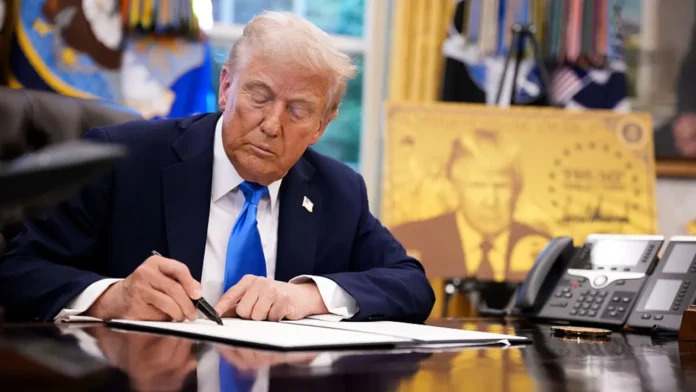The Middle East is positioning itself as a major winner in the wake of U.S. President Donald Trump’s new immigration policy, which introduces a $100,000 fee for H-1B visa applications.
The Gulf region’s aggressive drive to become a global artificial intelligence (AI) hub, backed by billions in investments, is emerging as a powerful magnet for top international tech talent.
Trump’s executive order, signed on September 19, 2025, also launched the “Trump Gold Card,” a program offering permanent residency and a pathway to citizenship for foreign nationals investing $1 million in the United States.
While the new policy seeks to tighten U.S. immigration controls and boost domestic investment, analysts warn it could backfire by pushing high-skilled workers toward other regions.
For Gulf nations, particularly Saudi Arabia and the UAE, this shift presents an unprecedented opportunity. Investors and executives point to the region’s proactive strategies, including Saudi Arabia’s Vision 2030 and the UAE’s National AI Strategy, both of which emphasize diversifying economies away from oil dependence and toward advanced technology sectors.
“Gulf countries, particularly Saudi Arabia, are offering compensation packages among the highest in the world to capture top AI talent from Silicon Valley,” said Francesco Filia, CEO of Fasanara Capital.
He noted that professionals are drawn not only by financial incentives but also by the chance to work on groundbreaking projects such as Saudi Arabia’s futuristic NEOM city and the UAE’s AI-powered smart city initiatives.
The UAE, once heavily reliant on expatriate workers in the oil and gas sector, has transformed itself into a commercial hub rivaling global centers like London and New York. Its visa reforms — from freelancer permits to 10-year Golden Visas — are designed to attract and retain a new wave of skilled professionals.
“Increasingly, top technology and fintech talent see the region not just as a stepping stone, but as a place to build, grow, and contribute meaningfully,” said Amina Taher, CMO of digital financial platform Wio Bank.
Business leaders argue that the welcoming environment in the Gulf contrasts starkly with restrictive immigration rhetoric in the U.S. and Europe. “In the UAE, talented people are welcomed with open arms,” said Simon Hopkins, CEO of Milltrust International Group. “The U.S. and the U.K. have both shot themselves in the foot with ill-considered immigration policies.”
Still, challenges remain. Unlike the U.S. or Europe, most Gulf states offer limited pathways to citizenship, leaving many professionals feeling like outsiders despite lucrative opportunities. “You will still be considered on the edge, and not part of the country,” said Michael Stull of ManpowerGroup UK.
Security concerns also cast shadows over the Gulf’s allure. Regional instability, including the ongoing conflict involving Israel and Hamas, and tensions with Iran, could deter some from relocating. Yet, for many top-tier professionals, the combination of tax-free salaries, world-class infrastructure, and access to billion-dollar innovation projects outweighs the risks.
As Trump’s policies reshape the global labor market, the Gulf is making a strong case to be the destination of choice for the next generation of tech pioneers.

